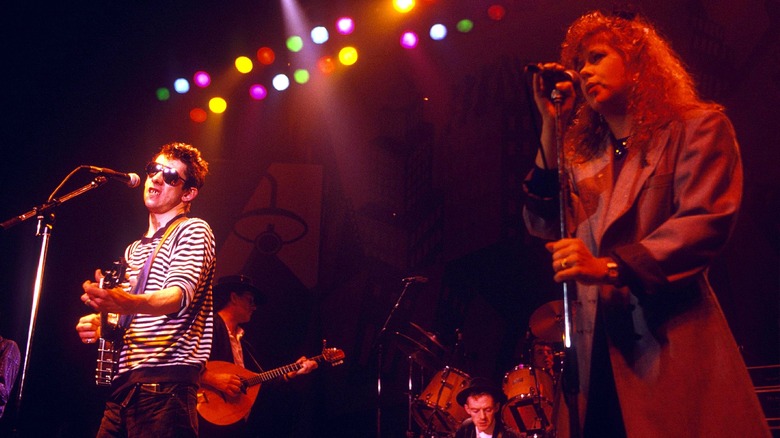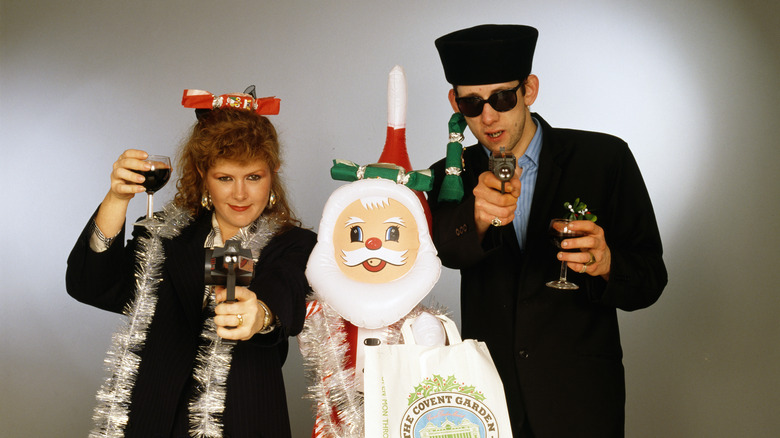The Story Behind The Pogues' Hit Christmas Song Fairytale Of New York
The Pogues' "Fairytale of New York" was first released back in 1987 and topped the charts in their home country of Ireland, staying in the running for seven weeks in total. It also hit No. 2 in the U.K. Over the years, the song has been re-released to respectable chart success in several European countries, but the truth is that for many people "Fairytale of New York" is far more than a chart hit. Written and recorded by a hard-rocking group of Irish musicians who were keen to incorporate traditional instrumentation and balladry into their music, the song has transcended the era in which it was recorded to become a timeless trad classic in its own right.
"Fairytale of New York" was written by frontman and primary lyricist Shane MacGowan and banjo player Jem Finer, who came up with the bulk of the story. It tells the tale of an Irish immigrant in New York in a drunk tank on Christmas Eve who — perhaps in flashback — then argues with his partner about his behavior. Whether the pair can ultimately reconcile is left unresolved. The song had a tortuous release, with the original female lead singer for the track, Cait O'Riordan, quitting the band before it could be finished. Thankfully, Kirsty MacColl was ready to step in as the female character opposite MacGowan and record one of the best-loved duets in musical history.
The origin of a classic
Shane McGowan was known for many things during his life, chief among them his propensity for hedonism. The classic Pogues album, "Rum, Sodomy, & the Lash," set the tone for the hard-partying band's lifestyle during their imperial phase, and they built a reputation for being one of the wildest touring acts on the planet. But more importantly, McGowan was acclaimed as one of the greatest songwriters of his generation, not just in his native Ireland but the whole world. And it was certainly his Irish upbringing that informed his lyricism and helped him create one of the most beloved Christmas songs of all time.
The circumstances that led the Pogues to write the festive song that would become their best-known hit are disputed. Per The Guardian, Pogues accordionist James Fearnley said it was their manager, Frank Murray, who suggested the band record a Christmas song. However, Murray thought they should record a cover version of The Band's "Christmas Must Be Tonight," a little-loved Robbie Robertson song on the outtakes-laden "Islands" album from 1977. It is said that the Pogues hated the song but decided that a festive number would certainly fit into their oeuvre, replete with references to traditional music and religion. On the other hand, MacGowan himself claims that it was Elvis Costello, their producer at the time, who suggested they write a Christmas duet as a bet.
Whatever the truth, it took the band two years to complete, with the songwriters working tirelessly to instill the tune with the epic cinematic tone they were looking for.
Controversy
The song goes through several movements. It begins with a slow solo introduction sung by Shane McGowan portraying the male protagonist in the drunk tank. Then the tempo increases to capture the character's dreams of his former love, their arguments captured in an evocative call and response that remains one of the most memorable parts of the song. But despite the hallowed reputation "Fairytale of New York" has established among fans and critics around the globe, it has grown increasingly controversial as the years have passed, particularly for the section described. As the call and response goes on, the two characters hurl insults at each other, including one homophobic and one misogynistic slur.
As a result, in 2020 some U.K. radio stations — including the BBC — refused to play the unedited version that climbed the charts in the late 1980s. Indeed, "Fairytale of New York" is at the center of a culture war. As many pointed out, however, the Pogues had already supplied a solution to the problem by performing an alternate version in 1992 with the lyrics altered to avoid causing offense. MacGowan reportedly had no issue with the song being censored on the radio, though he did defend his original lyrics, stating that the characters in it spoke accurately for people of their time and place and the "desperate" situation they were in, per The Independent.

